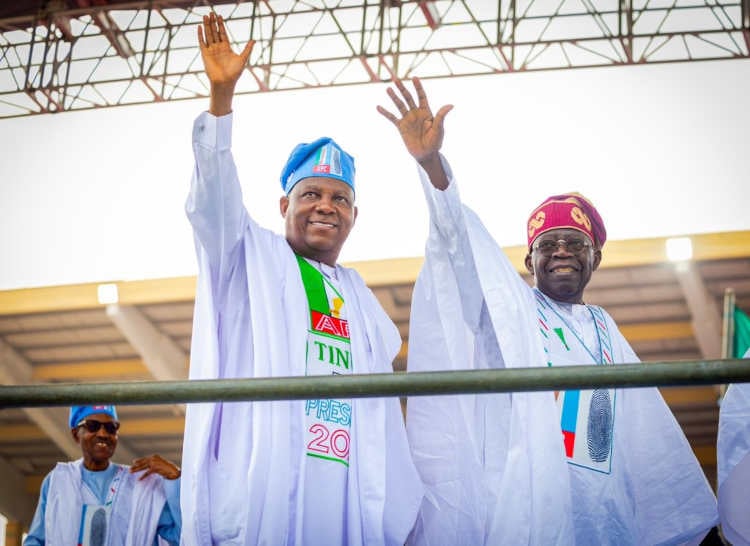Tension is mounting within the ruling All Progressives Congress (APC) as stakeholders in Nigeria’s Northeastern geopolitical zone threaten mass defection to the ADC (African Democratic Congress) unless President Bola Tinubu retains Vice President Kashim Shettima on the APC ticket for 2027. The threat, which insiders say is real and growing, exposes deep fractures in party unity – fractures that could severely undermine Tinubu’s re-election bid, according to multiple sources who briefed Huhuonline.com on the raging controversy.
Multiple APC sources have hinted to Huhuonline.com that Tinubu is considering dropping Shettima as running mate, possibly to pick another candidate from the Northwest, believed to have strong electoral weight. At a recent APC zonal meeting in Gombe (Northeast), virtually all party leaders including ministers, lawmakers, and governors from the North-east, conspicuously omitted Shettima’s name from their endorsement of Tinubu, sparking outrage among delegates. Both APC National Vice Chairman for Northeast, Mustapha Saliu, and the former APC National Chairman, Abdullahi Ganduje, who endorsed Tinubu alone, without mentioning Shettima’s name throughout their speeches, had to be escorted out of the venue by security operatives, amid chants of “No Shettima, no APC in the Northeast” Threats of defection to the opposition were voiced. But before the situation escalated, the governors of Yobe, Borno and Gombe, Mai Mala Buni, Babagana Zulum, and Muhammadu Yahaya, respectively, moved to calm the storm, by publicly affirming support for the Tinubu-Shettima ticket.
Shettima publicly signaled his discontent when he refused to shake hands with Ganduje at a reception in Akwa Ibom State honoring Governor Umo Eno, who had just joined the APC from the PDP. Video footage shows Shettima greeting Senate President Godswill Akpabio and Eno but bypassing Ganduje, standing third in line, to greet other dignitaries. For many, the gesture highlighted a growing rift over the 2027 presidential running mate ticket.
The threat of mass defection from the Northeast over Shettima is possibly the most dangerous internal crisis Tinubu faces for 2027 and has forced the Presidency into damage control mode. The Presidency’s insistence that Shettima will stay is trying to reassure Northeast APC that they have not been forgotten, and hopefully defuse threats of defection before they manifest, noted one source. A senior source close to the Presidency strongly denied any plan to drop the Vice President, declaring: “The president will run with Shettima. That said, denials alone may not suffice if underlying grievances (perceived sidelining, changing promises, exclusion) are not addressed.”
The Northeast is a critical region for APC. If the Northeast bloc does follow through, losing significant voter turnout, or worse, having voters switch allegiance to ADC (or even PDP) could erode Tinubu’s margin substantially. What may seem like regional discontent could translate into decisive losses in key states. Defection isn’t just about votes; it’s about morale and perception. If senior leaders, delegates, and grassroots mobilizers feel sidelined, the unity and discipline upon which APC depends might unravel. Worse, prospective defectors can embolden others; a domino effect that could lead to multiple zones threatening similar actions.
The ADC, historically less powerful than PDP and APC, stands to gain disproportionately if APC missteps. A mass defection could lend credibility and visibility to the ADC, making it a viable vehicle for disaffected APC members. This also gives opposition parties new talking points: fairness, inclusion, trust. The presidency depends on coalition building. If Tinubu is perceived as discarding Shettima, especially after repeated assurances to the contrary, that perception could damage trust among Northeastern elites and electorate. Losing Shettima’s home state(s) or Northeast bloc could force Tinubu into defensive politics, diverting resources to stem losses instead of campaigning aggressively nationwide. Furthermore, dropping a sitting Vice President without clear, credible justification can be spun as betrayal, ingratitude, or political calculation. For many in the Northeast, Shettima is seen not just as a political figure but as a regional representation. Removing him risks being read as marginalization in Nigeria’s regional politics.
While Tinubu appears for now committed to keeping Shettima, the repeated rumors, public omitting of his name, and anger among delegates show that loyalty is fragile. If Tinubu does drop Shettima, he risks turning an internal squabble into an irreversible rupture — potentially handing the opposition unexpected strength. But even if Shettima stays, unless the grievances are genuinely addressed, the energy of dissent could dim his reelection chances by undermining party cohesion and trust.





